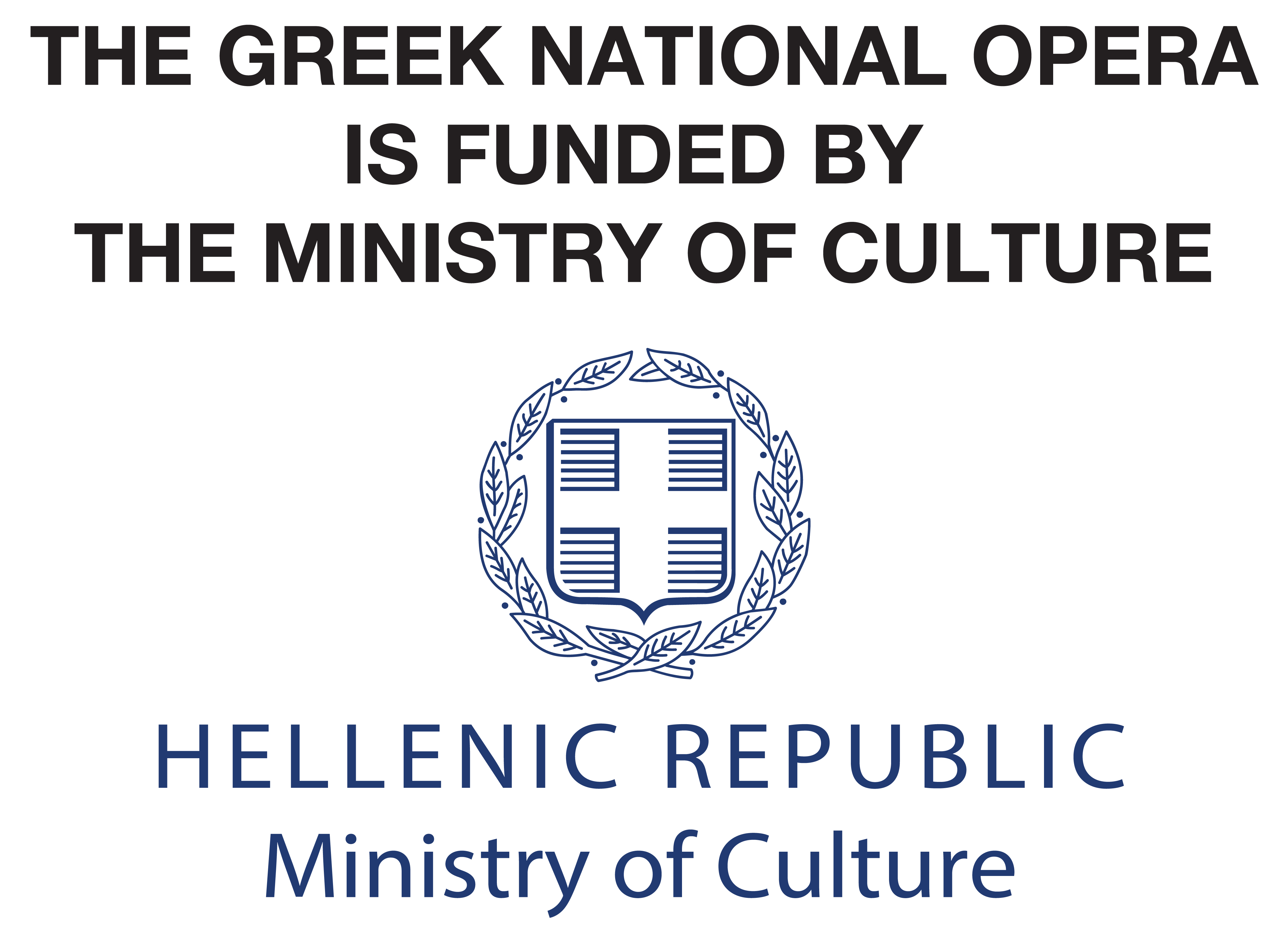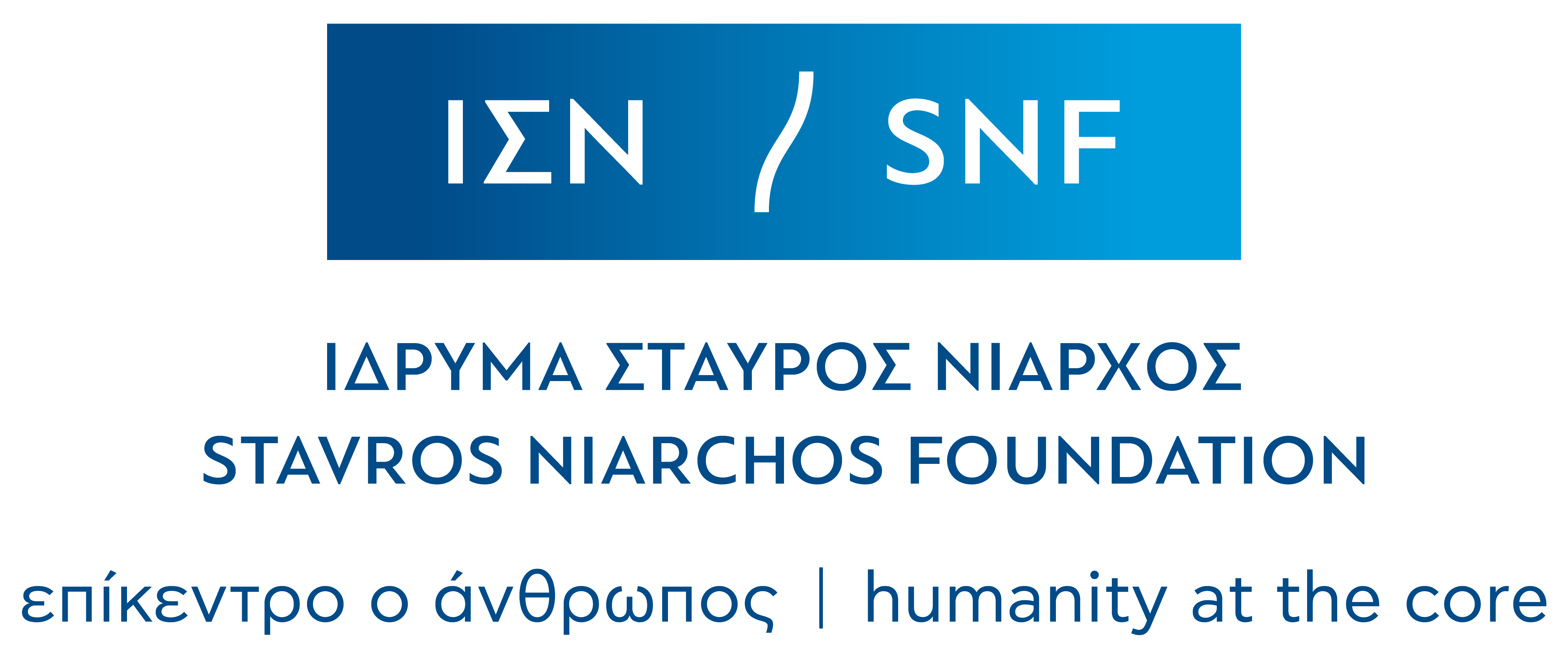Contact
ADDRESS
STAVROS NIARCHOS FOUNDATION
CULTURAL CENTER
364 Syggrou Avenue, Kallithea
TEL.
Box Office:
+30 213 0885700
Box Office email:
boxoffice@nationalopera.gr
Daily 09.00-21.00
info@nationalopera.gr
Register to our Newsletter

Musical direction: Phaedra Giannelou
Stage direction: Diana Theocharidis, Alexandros Efklidis
Set, lighting design: Gonzalo Córdova
Costumes: Luciana Gutman
Kassandra: María Castillo de Lima
Electronics operator, coffee shop patron: Giorgos Braoudakis
Featuring musicians from Ergon Ensemble: Kostas Tzekos bass clarinet, Konstantinos Panagiotidis violin, Dimitris Travlos violoncello, Charalambos Taliadouros percussion
Ticket prices: €15, €20 • Students: €10
Chamber opera • Commissioned by the GNO Alternative Stage • Revival
Greek National Opera Alternative Stage – SNFCC
Starts at: 20.30 (Sunday: 19.30)
Duration: approximately 70 minutes

Alternative Stage Founding Donor & Production Donor

Major Sponsor of the Greek National Opera



The provocative contemporary chamber opera Kassandra, created by distinguished Argentinian composer Pablo Ortiz and featuring a libretto by renowned Uruguayan dramaturg Sergio Blanco, returns to the GNO Alternative Stage after a highly successful series of performances in Buenos Aires, Athens, and Thessaloniki. The work, an international co-production with the Centro de Experimentación of the Teatro Colón in Buenos Aires, will be presented in two unique performances on 4 and 5 October 2025. The operatic Kassandra found its ideal embodiment in the face of Brazilian transgender soprano María Castillo de Lima, a performer with an exceptionally wide vocal range. The production is directed by Diana Theocharidis and Alexandros Efkleidis, and features musicians from Ergon Ensemble under the musical direction of Phaedra Giannelou.
The GNO Alternative Stage and the Centro de Experimentación of the Teatro Colón in Buenos Aires commissioned Pablo Ortiz to adapt Sergio Blanco’s monologue Kassandra into an opera. The main character, Kassandra, who is destined to wander at night on the outskirts of a nameless city in search of clients, blends the terrible with the sublime, the profane with the sacred, and the contemporary with the ancient, connecting the myth to the present through the music. It also connects the dramaturg’s aesthetic with that of the composer, both creators who collaboratively explore this constant hovering between the past, present, and future. These universes, so far apart from each other, are integrated into the directorial concept of Diana Theocharidis and Alexandros Efklidis, all within a single space.
The production was made possible by a grant from the Stavros Niarchos Foundation (SNF) [www.SNF.org] to enhance the Greek National Opera’s artistic outreach.
“I am not a man, I am not a woman; I am Kassandra.”
Uruguayan playwright Sergio Blanco, one of the most fascinating and intriguing voices in the contemporary global theatre scene, wrote Kassandra in Athens in 2008. Inspired by the legend of Kassandra, he wrote a heart-wrenching monologue. In this modern adaptation, the famous heroine from Troy is transformed into a transgender immigrant. Feeling like a foreigner in her own body, she tells her story in broken English, expressing her feelings of solitude, isolation, and the desire to be understood. The play had an amazing run, showcased over thirty times across five continents. It carved out a trajectory that led it to various venues, ranging from alternative theaters to prestigious stages, such as Le Palais des Papes in Avignon, Teatro Colón in Buenos Aires, and the Greek National Opera. “My text, Kassandra, was a veritable archaeological undertaking, in that from the outset I tried to unearth the myth in an attempt to understand it. I have never tried to explain our present through the myth. Quite the opposite: by starting from our time, I have sought to understand this myth which speaks to us in enigmatic terms of love and death, desire, violence, war... When I began writing this text in Athens, the first question I asked myself as I walked along Omonoia Square was: in the dark times we live in today, what could be better than to give the floor to a foreigner who, out of her own clandestine existence, uses language in complete freedom, without submitting to any linguistic, moral or cultural constraints? That's how I came to give life to this Kassandra, who is no longer a prisoner of one genre or another but is taking her freedom into her own hands. You'll see that this Kassandra has no passport, and that allows her to walk through any gate, including the gate of death. In the end, Kassandra is not a prisoner of any era. To listen to Kassandra is to understand that the freedom that defines her is not an ideal to be pursued but a construction that she has forged with incredible beauty. Just as Flaubert was wont to say that Madame Bovary was himself, I'd like to be able to say: “Kassandra is me”, notes Sergio Blanco.
From bel canto to rap: Pablo Ortiz’s subversive composition
The chamber opera Kassandra bears the signature of the award-winning Argentinian composer Pablo Ortiz, who is also a professor of composition and music theory at the University of California, Davis, with a significant contribution to modern music. The opera, which will be revived at the GNO Alternative Stage, conducted by Phaedra Giannelou and featuring musicians from the Ergon Ensemble, is tailored to the unique voice of transgender soprano María Castillo de Lima, known for her pioneering career in opera. The composer notes: “Kassandra sees both the future and the past, while living in a present informed by these visions. The music, on the other hand, references distinct operatic traditions and incorporates rap, prose, and bel canto singing, along with a powerful vocal performance that showcases our diva’s exceptional talent. The orchestration is simple, with a few distinct colours accompanying the voice. The vibraphone, string instruments, and the bass clarinet, along with a few touches of electronic music, offer a limited yet unexpectedly diverse accompaniment. My goal was to compose a work accessible to the average opera enthusiast, which brings out the unique qualities of María ’s voice, along with its exceptional dramatic flexibility. I also intended to capture the emotional depth hidden in Sergio Blanco’s text, the unadorned beauty of his broken English, and the multiple meanings embedded in its seemingly simple structure.”
Directing Kassandra: between prophecy and acceptance
The stage direction of the opera is credited to Diana Theocharidis, a Greek-born artist who currently resides and works in Buenos Aires, and Alexandros Efklidis. The two directors have created a performance about the modern challenges of identity and acceptance, telling the story of a woman who possesses the gift of prophecy but is condemned not to be believed by anyone. The directors note: “Kassandra, the cursed priestess of ancient Greek mythology, possesses the gift of foreseeing the future. However, like all the oracles of the ancient Greek world, she also sees the past; the oracle’s insight encompasses both the present and the absent. Kassandra, who received the gift of prophecy, was cursed by the god Apollo so that no one would believe her words. Inside her, there is inherent both the tragic fate of humanity and that of the stranger, the refugee, and the socially and gender marginalized individual. She sings and speaks in broken English, the English of someone who hardly knows the language yet is driven by the desire to be understood.”
A voice beyond limits: María Castillo de Lima’s Kassandra
The operatic role of Kassandra found its perfect embodiment in the Brazilian transgender soprano María Castillo de Lima, a performer with an exceptionally wide vocal range. Born in São Paolo, Brazil, she moved to Argentina, where she carved out a career in music. Although she was initially singing in the tenor range, she switched to soprano after her gender transition, becoming the first transgender singer to perform as a soprano at the historical Teatro Colón in Buenos Aires.
Her career is marked by her extraordinary vocal skills and persistence, which make her a source of inspiration for the transgender community. Despite her humble beginnings – her father was a construction worker, and her mother used to sing at the church – María started learning music at an early age and was even given the nickname "Little Mozart” due to her exceptional musical skills. She joined the choir of the Teatro Colón as a tenor in 2010 and later transitioned to soprano in 2019, an achievement that marked both her personal and professional trajectory. “I do not look back on the past in pain. I view it as a period that helped me build who I am today, personally and artistically”, she said in a big tribute to her work, which was published in the New York Times.
The lighting design for the opera Kassandra carries the signature of Gonzalo Córdova, while Luciana Gutman is in charge of the costumes.
Featuring musicians from the Ergon Ensemble: Kostas Tzekos bass clarinet, Konstantinos Panagiotidis violin, Dimitris Travlos violoncello, Charalambos Taliadouros percussion
Brief biographical notes
Phaedra Giannelou
Born in Athens. She graduated with honours from both the undergraduate and postgraduate programmes in Orchestral Conducting at the Department of Music Studies of the Ionian University, under the supervision of Professor Miltos Logiadis. In 2012, she was declared a PhD Candidate at the same department. She has conducted symphony orchestras in the USA, Chile, Russia, and throughout most of Europe, and has attended masterclasses with internationally renowned conductors such as Bernard Haitink, Kurt Masur, Jorma Panula and Neeme Järvi, among others. She has also collaborated with ensembles and institutions including the Athens State Orchestra, Thessaloniki State Orchestra, Symphony Orchestra of the Hellenic Broadcasting Corporation, Orchestra of Colours, Sistema Europe Youth Orchestra, Greek Composers’ Union, Athens Concert Hall, Thessaloniki Concert Hall, Athens Epidaurus Festival, Kyklos Ensemble and Canadian Brass. In 2013, she was awarded second prize (with first prize not awarded) at the International Competition “Solon Michaelides” for Young Conductors organised by the Cyprus Symphony Orchestra and, in 2020, she completed the international Global Leaders Programme, run in collaboration with nine leading USA universities, earning a postgraduate degree in Social Entrepreneurship and Cultural Management.
Diana Theocharidis
She was trained in various disciplines, dance, music, philosophy and psychology, in institutions such as the Taller de Danza Contemporánea del Teatro San Martín and the University of Buenos Aires in Argentina, at the IRCAM in France, as well as with various teachers, such as Alwin Nikolais and Malou Airaudo. Her shows have been performed in Argentina, Chile, Brazil, Venezuela, Mexico, Italy, France, Poland and Finland and are closely linked to music. She has collaborated with composers such as Giacinto Scelsi, Mauricio Kagel, Pascal Dusapin, Kaija Saariaho, Martín Matalon and Pablo Ortiz. As a choreographer, she worked in opera houses such as Teatro di San Carlo in Naples, Opera Krakowska, Teatro Colón, Teatro Argentino, Sodre in Montevideo, Palacio Euskalduna in Bilbao, Teatr Wielki in Poznań, Olavshallenn in Trondheim, Thessaloniki Concert Hall and National Operas in Finland and Croatia. In addition, she has staged musical works at the Teatro Colón, the Centquatre in Paris and the Finnish Opera, among other venues. She was Director of Dance of the Fondo Nacional de las Artes, of the Company of the UNA and the Teatro de la Ribera. She is the director of the Centro de Experimentación del Teatro Colón.
Gonzalo Córdova
He has designed the lighting of opera productions in collaboration with Rubén Szuchmacher, André Heller-Lopes, María Jaunarena and Ana D’Anna, at the Teatro Colón and several other theatres in Latin America and Europe. He has collaborated with Diana Theocharidis in dance productions. As a set and lighting designer, his work was highlighted in Gandini en escena, at the CETC. He has written two essays on stage lighting, La trampa de Goethe and La iluminación escénica. He has won numerous awards, including a Konex mention in 2011. He is a professor at the National University of Arts and a member of the Association of Scene Designers of Argentina (ADEA).
Luciana Gutman
Argentinian costume designer with a long career in theatre and audiovisual media. She has designed costumes for opera, dance and prose theatre. She has worked for the most important theatres in Argentina such as Teatro Colón, Teatro San Martín, Teatro Alvear and Teatro Cervantes, among others. She has participated in productions in the United States, France, Monte Carlo, Greece, Czech Republic, Poland, Latvia, Chile, Mexico, Colombia, Brazil and Uruguay. She also teaches costume design at the Instituto Superior des Artes del Teatro Colón. She has given seminars for the UNAM in Mexico and the National University of Arts in Buenos Aires.
María Castillo de Lima
Born in São Paulo, Brazil and studied at the Conservatorio de Música Gilardo Gilardi of La Plata in Argentina. She was a member of the Ópera Estudio and the Coro of the Teatro Argentino de la Plata. She has performed principal roles in Anna Bolena, Maria Stuarda, Norma, Il trovatore, Tosca, Nabucco, Adriana Lecouvreur and Andrea Chénier. She sang in Madama Butterfly in 2014 at Teatro Colón. She participated in the 15th Montserrat Caballé International Singing Competition in 2015 in Zaragoza, Spain, and won the second prize in the 1st International Singing Competition of Ópera Mendoza, in 2019. Also in 2019, she was distinguished as Outstanding Personality of Culture by the Concejo Deliberante of La Plata. Among other venues, she sang at the Teatro Colón in Mar del Plata, the Teatro Argentino de La Plata, the Teatro Avenida and the Teatro El Circulo de Rosario. She teaches in the department of Lyrical Chamber Music Repertoire at the Conservatorio de Música Gilardo Gilardi and in the Escuela de Arte of Berisso. She is the founder and director of the Masciadro Cultural Centre.
STAVROS NIARCHOS FOUNDATION
CULTURAL CENTER
364 Syggrou Avenue, Kallithea
Box Office:
+30 213 0885700
Box Office email:
boxoffice@nationalopera.gr
Daily 09.00-21.00
info@nationalopera.gr